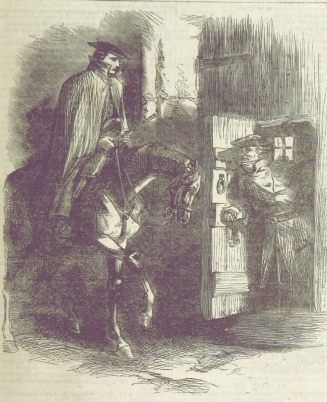
I do have an obsession for highwaymen, especially the 17th century variety. It’s possibly because the most famous of this collection were closely associated with the English Civil War and had fought for the king. Many soldiers returned from the war to impoverished conditions and some turned to highway robbery. Others continued to war against the enemy on the highway instead of a battlefield; and still others just took advantage of the upheaval to make a ‘living’.
Let me introduce to you three of my favourite 17th century highwaymen.
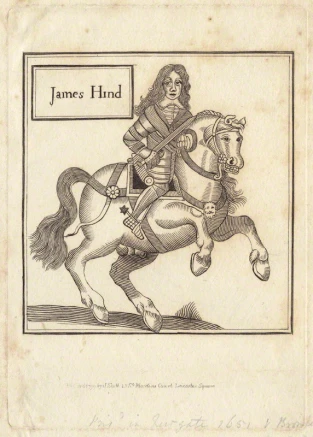
Without a doubt, Captain James Hind tops my list. Also known as the Royalist highwayman, Captain Hind earned quite a name for himself around the time of the English Civil War for his cunning and all around cheekiness against the Roundheads. He had fought on the side of the King against Parliament and eventually was hanged drawn and quartered for it. His adventures were the popular fodder for chapbooks and pamphlets during his day (and even years later). Many of the stories cast him as a Robin Hood figure. Though the majority of the stories cover the time before the war, he is best known for his exploits following the execution of King Charles I.
Captain Hind escaped the small village of Chipping Norton and a dull life of as a butcher’s apprentice for the excitement and adventure of London. After spending freely the little coin he had on women and drink, he ended up falling into a group of highwaymen known as the Bishop Allen gang, because their leader often disguised himself as a high-ranking clergyman to dull the suspicions of his mark.
Hind was a master of disguise and used his wits to separate his victims from their money instead of brute force or violence. He was known as a courteous fellow who enjoyed a good jest. The English Guzman, printed in 1650, was an extensive collection of his early exploits and organized as episodic chapters in the young highwayman’s life. Here’s one where he dabbles in a bit of horse trading.
Following a series of lucrative adventures, Hind found himself flush with coin, fine clothes and a respectable mount. While dining at an inn, Hind’s horse attracted the interest of one of his dinner companions, a man who knew nothing of Hind’s true profession. This man offered to trade his own horse (a gelding) plus £20 in exchange for Hind’s finer horse. Hind accepted the trade.
The next morning, Hind offered to ride with his new friend, and out of courtesy, see him on his way. As they journeyed through Enfield-Chase, Hind found fault with how the man handled his new horse’s reins, saying, “he is tender mouthed, and you will put him quite out of his pace.”
Hind convinced the man to dismount so he could show him how to pace his former horse correctly. You know where this is going, don’t you? The man alighted and the two switched horses. Now Hind was back on his former horse paced him a little way and told his companion, “Sir, you shall see his true pace the next time you see me,” and then galloped away. At first, the man thought this was a joke, then realized he had just been held up without once having had a shot fired at him.
A cautionary tale—never horse trade with a highwayman.
What happened to Hind? The civil war broke out and he and his companions (what remained of the Bishop Allen Gang) joined the King’s army against Parliament. King Charles I ultimately lost and lost his head on a scaffold outside Whitehall’s Banqueting House on January 30, 1649.
Shortly after that, Hind left England for The Hague and after staying there a few days, sailed for Ireland with the “King’s effects” (the future King Charles II). He fought there before joining Charles II in Scotland just before Charles tried to win his crown from Parliament.
The last battle of the civil war was fought at Worcester and Oliver Cromwell soundly defeated the King’s forces. Charles escaped, as did Hind. There was plenty of speculation in the streets of London that Hind helped Charles in his escape. Hind was eventually captured, tried, and convicted, not as a highwayman, but as a political prisoner. He remained a staunch Royalist to the very end. If you’re interested in a more detailed account of his life, check out my post on The Royalist Highwayman.

Claude Duval had been a footman in the service of an English aristocrat, the Duke of Richmond. The duke had been associated with Charles II’s exiled court during the years when Oliver Cromwell was Lord Protector of England.
When the King was restored in 1660, the King and his gentlemen returned back to England to live the high life. It’s not uncommon for highwaymen to first earn a respectable living in a gentleman’s household, serving as footmen as Duval did. Their manners were polished up, and they quickly earned a reputation for wit and stylish manners.
One of the best known Duval stories, and which probably contributed to his raffish reputation, was when he stopped a coach and found a gentleman travelling with his very beautiful wife. Duval, not being immune to the fair sex, began flirting with the woman. Duval offered to allow the husband to keep some of the coin he was about to steal from him if the man’s wife agreed to dance the “courante” with him. To the horror and outrage of her husband, the lady stepped out of the coach and danced with a highwayman. I can imagine the argument they had on their way home.
After Duval was executed (truly, most highwaymen dido end that way), the following memorial was written about him:
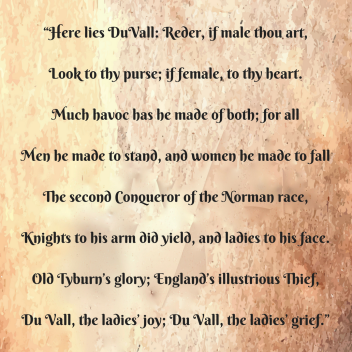
A highwayman might have quick wits and a good shot, but he’s nothing without his horse. William Nevison was a gentleman rogue and called Swift Nick by Charles II. Yes, that same king. By now you’re thinking that Charles should have been the Highwayman’s Monarch instead of the Merry Monarch. Like Captain Hind, Nevison saw military action, only in Nevison’s case it had been in France for the Duke of York (Charles II’s brother James) in 1658. When Nevison returned to England, he found himself a soldier at loose odds and applied himself to highway robbery. Similar to Hind, Nevison used his wits over brute force to win his coin.
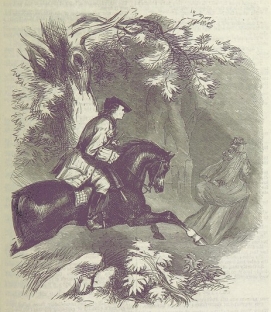
One day, Nevison robbed a coach along Gad’s Hill, and he must have worried that he’d have been blamed for this. Perhaps they recognized him or his victim was someone of importance? Anyway, Nevison spurred his horse and headed north for the sole purpose of establishing an alibi. According to the legend of Swift Nick, he covered 200 miles in one day! By sundown, he arrived in York and joined the town’s Lord Mayor in a game of bowls. When the authorities came to arrest Nevison, he claimed that it was impossible for him to have been in Kent, much less robbing someone, given that he was with the Lord Mayor of York later that same day. The distance made it impossible, he claimed. His defence worked. He was acquitted, though eventually justice caught up to him.
Those are just a few of my favourite stories. The common thread that runs through these highwaymen tales, is that wit wins the day.
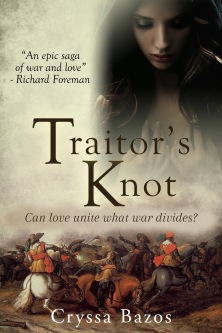
If you’re interested in stories of high adventure and clever highwaymen, check out my novel Traitor’s Knot, the story of love and conflicted loyalties set during the English Civil War.
“A gripping tale of courage, love, and enduring commitment, a story that is well-imagined and executed with grace and mastery.” ~ Readers’ Favorite
Always entertaining and, of course, informative.I remember as a young child listening to my father as he recited the “Highwayman”‘ poem and shivering in fearful delight! :)Jacquie aka Aimee
LikeLiked by 1 person
Thank you! It should come as no surprise that I adore that poem. I break out into reciting whenever I see a full moon floating above a sea of clouds.
LikeLike
I loved the stories. Thank you for sharing them!
Poets are harder on highwaymen than novelists are. Or at least the movie versions of the novels. I remember Moll Flanders, where a swoon-worthy Daniel Craig ended up living happily ever after with Moll. And there was that movie with Hugh Grant as a highwayman who secretly serves King Charles. Hmmmn. Any other good highwaymen movies that you can think of?
LikeLiked by 1 person
I’m glad you enjoyed them! Agreed about Daniel Craig. There is a shortage of highwayman movies, period. Lots of pirate and smugglers movies, however. We’re long overdue. Film makers take note.
LikeLike
Swift Nick is by far my favourite. Love the story that he ‘died’ in prison and his body was taken away by ‘doctors’. For a while he became the ‘ghostly highwayman’ as his victims believed he were dead! A FB friend has, for a couple of years now, been trying to put together a film called ‘Gallows Bait’ being the ‘true story’ of Dick Turpin. Alas, funding has not yet been forthcoming. FB page is ‘Stand and Deliver’ ….
LikeLiked by 1 person
I follow that FB page (surprised?) but I haven’t seen any recent updates in my feed. Good reminder to check out what they’re up to. Love their pictures.
LikeLike
I was – thought I was the only one! Yes, Tony hasn’t posted for a while and when he does it is mostly of the ‘I haven’t forgotten’ type’. shame.
LikeLiked by 1 person
It is a shame. I always enjoyed his posts.
LikeLike